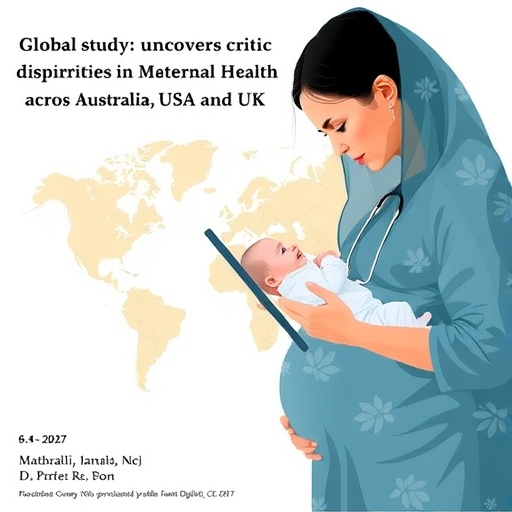A sweeping international review led by researchers at Flinders University reveals significant demographic shifts and emerging health challenges in childbirth across Australia, the United States, and the United Kingdom. Published in the Journal of Clinical Medicine, the study meticulously analyzes twenty years of pregnancy and birth trends, uncovering critical insights into maternal age, health disparities, and systemic stresses impacting prenatal care in these high-income nations.
Central to the review is the striking trend of delayed motherhood. The average age of first-time mothers has steadily risen, with many women now embarking on parenthood at 35 years or older. This demographic shift reflects a complex interplay of societal changes—including career priorities, economic factors, and enhanced access to contraception—reshaping reproductive timelines. However, this postponement carries multifaceted health consequences, notably increasing the incidence of gestational diabetes, hypertensive disorders, and higher rates of cesarean deliveries.
Maternal health outcomes are intricately linked to these rising maternal ages, demanding a critical examination of how healthcare systems are adapting. Older mothers exhibit greater engagement with prenatal services, yet they encounter elevated risks of obstetric complications and interventions. The review suggests that such trends provoke essential questions regarding the adequacy and responsiveness of current maternity care protocols, particularly as they relate to managing age-associated perinatal risks.
Concurrently, a notable decline in fertility rates pervades Australia, the United States, and the United Kingdom, with birth rates dipping below the replacement threshold required to maintain stable population levels without immigration. The underlying causes span economic uncertainties, evolving family dynamics, and personal reproductive choices. This phenomenon portends significant societal and economic repercussions, ranging from workforce demographics to social service structures in the decades ahead.
Amidst declining birth rates overall, the review highlights an uptick in childbirth among Indigenous and ethnic minority populations. Despite this increase, these communities continue to experience pronounced health inequities. In the United States, for example, Black, Indigenous, and Hispanic women disproportionately face elevated maternal mortality rates, a disparity rooted in structural inequities and limited access to quality care. Australia’s Indigenous women and migrant populations in the United Kingdom encounter similarly alarming gaps in prenatal and perinatal care outcomes.
The advent of the COVID-19 pandemic further strained already stressed maternity care infrastructures. The disruption of prenatal and hospital services in the United Kingdom, in particular, has been linked to an increase in maternal mortality. Such outcomes disproportionately affected women from disadvantaged backgrounds, accentuating systemic vulnerabilities and exposing critical weaknesses in emergency healthcare responsiveness for pregnant populations.
A surge in cesarean section deliveries unveils another dimension of evolving childbirth practices. Predominantly observed among older mothers and those delivering in private healthcare settings, this trend raises questions about the drivers behind increased surgical interventions. Whether influenced by patient preference, clinical necessity, or systemic incentives remains an area of debate. Notably, the escalation in cesarean rates does not necessarily correlate with improved perinatal outcomes, prompting calls for value-based, woman-centred care models.
Pregnancy-related metabolic conditions, primarily gestational diabetes and hypertensive disorders, have also registered an upward trajectory. These conditions threaten both maternal and neonatal short- and long-term health, imposing additional burdens on healthcare systems. Particularly prevalent among older mothers and certain ethnic groups, these complications demand targeted clinical attention and culturally competent care strategies.
Yet, the study offers glimmers of progress amid these challenges. Smoking during pregnancy is on a decline across all three countries, a development likely contributing to improved neonatal health metrics. Breastfeeding rates are ascending in Australia and the United Kingdom, reinforcing infant immune protection and maternal well-being. Conversely, the United States continues to lag in breastfeeding adoption, hindered in part by the absence of a comprehensive national paid maternity leave scheme.
The review’s findings underscore an urgent imperative for systemic reform to enhance maternal health equity. Senior author Professor Claire Roberts advocates for health systems to adopt culturally safe, equity-driven, and responsive interventions. Improved data collection and international collaboration emerge as crucial pillars to mitigate preventable pregnancy-related harms and to bridge existing service gaps.
The authors propose a multifaceted policy approach emphasizing national targets to reduce maternal mortality and stillbirth, the adoption of continuity of care models led by midwives, and transparent reporting of maternal outcomes stratified by race and socio-economic factors. Additionally, expanding culturally tailored perinatal programs such as Australia’s Birthing on Country initiative holds promise for Indigenous and minority communities elsewhere.
Addressing entrenched systemic biases, the study calls for mandatory anti-racism and structural competency training among maternity care providers to diminish disparities in clinical decision-making. Funding reforms are essential to realign incentives away from unnecessary cesarean procedures toward person-centred care. Universal paid parental leave, exemplified by Australia and the United Kingdom, is advocated for implementation in the United States to bolster maternal and infant health outcomes.
Furthermore, enhancing postpartum care, particularly for women with gestational diabetes or hypertensive disorders, is critical for managing long-term health risks. Tackling social determinants of health—including secure housing, adequate income, and food security—is presented as indispensable for improving pregnancy and birth outcomes. Finally, the establishment of an international maternal health equity taskforce is urged to coordinate global efforts in reducing healthcare disparities and promoting best practices.
This comprehensive review by Anya L. Arthurs and colleagues offers a detailed, data-driven roadmap for confronting the evolving challenges in maternal health across three major high-income countries. Its insights compel policymakers, clinicians, and researchers alike to prioritize equity, cultural safety, and systemic resilience in maternal care, ensuring healthier futures for mothers and their children worldwide.
Subject of Research: People
Article Title: Pregnancy and Birth Trends Across Australia, the United States of America and the United Kingdom
News Publication Date: 18-Aug-2025
Web References: http://dx.doi.org/10.3390/jcm14165841
References: Arthurs, A.L., Harrison, J.K., Williamson, J.M., Roberts, C.T. (2025). Pregnancy and Birth Trends Across Australia, the United States of America and the United Kingdom. Journal of Clinical Medicine. DOI: 10.3390/jcm14165841
Image Credits: Flinders University
Keywords: maternal health, pregnancy trends, childbirth, cesarean section, gestational diabetes, maternal mortality, health disparities, prenatal care, indigenous health, maternal equity, public health policy, international collaboration




